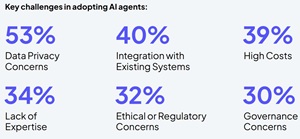Data Privacy Emerges as Key Hurdle in AI Agent Adoption
Organizations face significant barriers in adopting AI agents, with data privacy concerns topping the list, according to a new Cloudera report.
A new Cloudera report reveals that while enthusiasm for AI agents is high, organizations are grappling with major adoption barriers, with data privacy emerging as the top concern.
The Rise of AI Agents
AI agents represent a significant leap from traditional prompt-and-response AI models. These advanced systems enable autonomous reasoning, decision-making, and multi-step task execution, effectively transforming AI from a passive tool into an active collaborator. As organizations increasingly embed these agents into core IT systems, customer interactions, and infrastructure optimization, concerns about data privacy have come to the forefront.

Top Barriers to Adoption
The report highlights several critical challenges organizations face when adopting AI agents:
- Data Privacy Concerns (53%): The foremost issue, with organizations worried about safeguarding sensitive data.
- Integration Complexity (40%): Many enterprises struggle to integrate AI agents into existing legacy systems and cloud architectures.
- High Costs (39%): Scaling and operationalizing AI agents require significant investment in infrastructure, security, and skills development.
- Lack of Expertise (34%): Organizations face difficulties in finding or training staff capable of managing agentic AI effectively.
- Ethical and Regulatory Concerns (32%): Worries about biased decisions or compliance violations.
- Governance Concerns (30%): Concerns about monitoring and controlling autonomous agents.
The Path Forward
The report emphasizes that deploying AI agents is not a plug-and-play endeavor. Organizations must:
- Evaluate their existing infrastructure to ensure it meets data management, security, and compliance standards.
- Invest in training teams to effectively manage and deploy AI agents.
- Start with small-scale implementations to assess impact before expanding.
For more insights, see Cloudera's State of Enterprise AI report.
"37% of surveyed enterprises report that integrating AI agents into current systems and workflows has been very or extremely challenging," the report notes, underscoring the complexity of adoption in large organizations with complex IT ecosystems.
Related News
Beginner-Friendly AI Agent Projects to Learn and Build
Explore five practical AI agent projects for beginners, covering scheduling, coding, content creation, research, and search functionalities.
Claude Sonnet 4 5 Advances AI Agents Toward OS Like Capabilities
Anthropic's Claude Sonnet 4.5 coding model demonstrates how AI agents could evolve into dynamic operating systems, raising questions about future app development and security.
About the Author

Dr. Lisa Kim
AI Ethics Researcher
Leading expert in AI ethics and responsible AI development with 13 years of research experience. Former member of Microsoft AI Ethics Committee, now provides consulting for multiple international AI governance organizations. Regularly contributes AI ethics articles to top-tier journals like Nature and Science.